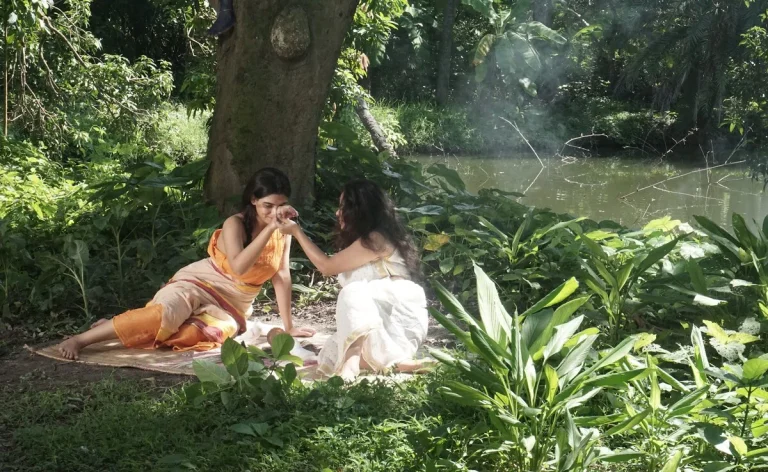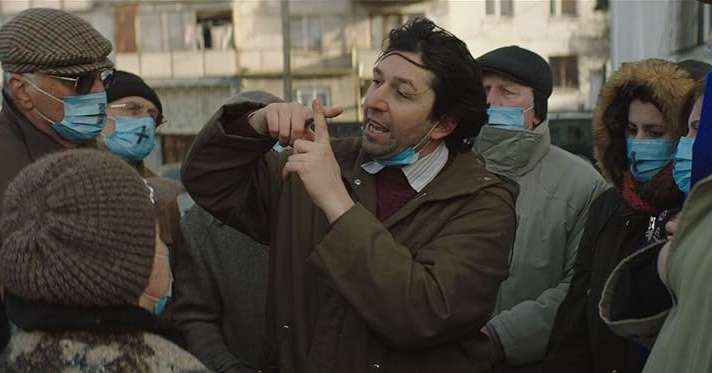When I had the following conversation with my friend Tathagata Ghosh, he was packing his bags to attend the prestigious Vancouver International Film Festival (VIFF), where his latest short, “Amar Comrade”, will be screened. On the one hand, this certainly is another esteemed feather in his cap, and on the other, the event must have been quite emotional for him, as he was to attend one of those festivals as a filmmaker, which, ten years ago, he had attended as a student of filmmaking.
Long before “Amar Comrade”—at least that is what I believe—Tathagata has succeeded in making himself distinguishable from his contemporary voices as a politically committed filmmaker. Though he refrains from registering himself in typical political discourses, his films are anti-establishment in nature and express dissent against the growing socio-political tensions created by the far-right establishment.
In “Amar Comrade,” Tathagata’s approach towards filmmaking has taken a new turn. Much more than critiquing a thing or two, he delved deep into the milieu of a tribal community. His attempt to incorporate a legislative act on forest rights and deal with—his signature—the gender/sexual question as a meta-text under the grand narrative of state repression, traumatic past of individual and politics has made this film something like an endeavour to reiterate a history so that the sedimentation of events doesn’t make it disappear from our collective consciousness after a time.
Below is my correspondence with Tathagata. I hope you’ll find it engaging.
Soumalya: Hello, Tathagata. First of all, congratulations on your latest short, “Amar Comrade.” We are hearing great appreciation coming from various corners of the world for your film. Your commitment towards endowing voice to the marginal sects makes us very proud. The first thing I want to know is: how is the audience reaction you have noticed at the premieres, both in India and outside India?
Right now, the world is witnessing the worst kind of neocolonization, imperialism, and warmongering. Communists are failing to play the role they should’ve played at this juncture. The internationalism of the working class has constantly waned in the post-Soviet era, and the growing contemporary right-wing popular politics regards any communist impression in art with either suspicion or takes a jibe at it by calling it nostalgia for the past. So, tell us a bit about the audience reaction.
Tathagata Ghosh: Hi Soumalya. Thank you for the kind words. It’s great to be talking to you about “Amar Comrade.” To answer your question, I must say the audience reaction has been great so far wherever we have screened the film. And, as you know, we have been picked up by some of the most prestigious film festivals out there, such as the Arizona International Film Festival, where we had our World Premiere earlier this year, and we have also screened at the Oscar-qualifying film festivals. Right now, we are gearing up for the Vancouver International Film Festival, which is coming up on 11–12th October.
Also Read: Mangsho [2020] Short Film Review: Raw, Unpleasing, and Unforgiving
In a nutshell, I can say “Amar Comrade” has been received very warmly by all kinds of audiences, be it the audiences who gathered at the Kashish Film Festival, which is a queer film festival, as you know, or at any other film festival. In the context of indigenous cinema, queer narratives have not been explored before; it is still a very new thing. And with “Amar Comrade,” I wanted to challenge the popular conception of heteronormativity, and I enjoyed the process. You are right that the marginalized are constantly being suppressed by the upper class, who want their hegemony to exist.
For a long time, the marginal communities of Junglemahal have been demanding that their ‘Sarna’ religion be acknowledged, but as you know, the right-wing politicians in power want a monotheistic culture and are constantly curbing the Junglemahal tribes’ demands. So, any piece of art that advocates for the tribals or upholds their demands is looked at with suspicion because it challenges the right-wing hegemony. With “Amar Comrade,” I wanted to initiate a dialogue between the two politically antagonistic forces, and the way it has been received, I cannot be happier.
Soumalya: You have not provided a particular timeframe for the film, which in a sense brings forth the eternal conflict between Maoist guerrillas and the Indian central or state governments, but there’s a reference to the 2006 Forest Rights Act. In the opening sequence, you have also used a newsreel, and the character ‘Bikash’ comes out as if straight away from the newsreel. So, shall we consider that the film is set in 2006? If so, then please tell us the reason behind choosing that year. Is there any particular significance to this choice?
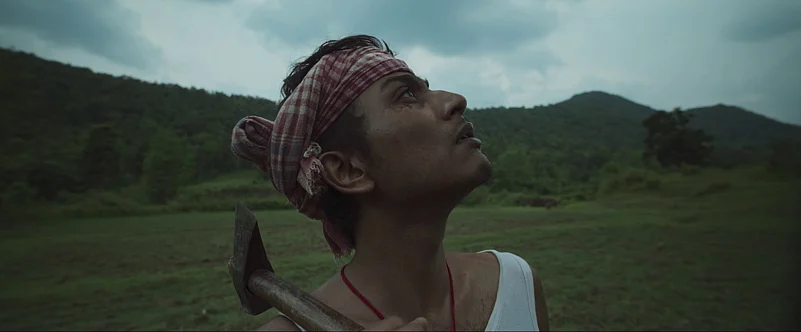
Tathagata Ghosh: No, there’s no fixed time frame. Actually, I tried to avoid providing a specific timeframe. I referred to the Forest Act because I wanted to highlight how, every now and then, legislative acts are being passed but end up without serving the people for whom the act was created.
Big corporate companies have been usurping the lands of tribals for a long time, and corporate greed is primarily responsible for the meager condition of a lot of the indigenous population. I decided not to use a particular timeline to argue that these problems—the ones we are discussing—are perennial. And to answer the second part of your question, all I can say is I constructed Bikash’s introduction that way because I wanted to blur the line between reel and real.
Soumalya: Now I’d like to talk about a particular scene construction. Since I know you personally, I know that you admire Satyajit Ray a lot. In “Pratidwandi”, there’s a scene where the protagonist Siddhartha looks at the mirror and visualizes himself as Che Guevara. Perhaps it was his conscience that made him visualize himself that way.
Now, in “Amar Comrade”, you have done quite a similar thing. In the scene, Bikash is taking a bath, and Nondo stealthily takes Bikash’s cap and wears it. In the very next moment, he visualizes himself as a guerrilla fighter and a worthy comrade of Bikash. Did you have the “Pratidwandi” scene in your mind as a reference point during the construction of this scene?
Tathagata Ghosh: Spot on! You’re damn right. That scene from “Pratidwandi” has worked as an inspiration, but you know it didn’t come to my mind while making the film. Later on, I realized that probably that particular scene unconsciously inspired me to create the scene you’re talking about. I find myself a lot in Pratidwandi’s Siddhartha, and I tried to explore a lot of personal feelings through ‘Nondo’ in my film. You can see that there’s a story of discovering oneself in “Amar Comrade” as well. So yeah, in a sense, that scene is a homage to “Pratidwandi” and not only that, I tried to follow Ray’s footsteps in creating the sound design too. The way he used drums and other instruments really inspired me to do something similar in designing the background score of “Amar Comrade.”
More Read: Miss Man [2020] Short Film Review – Journey Through the Earth Between the Binary
Soumalya: The soundscape of “Amar Comrade” is very impressive. Is it made of tribal instruments only? And there’s a tribal song in the film too. How did you explore this music, and what made you incorporate a full soundscape made of tribal music, which is largely unexplored by the regular audience, in the film?
Tathagata Ghosh: Thank you so much for appreciating the soundscape. Yes, tribal instruments are used in the score when needed to surge the emotions or moods. But apart from that, I have used natural sounds, such as the rustling of leaves, the sound of birds, and sometimes also the sound of walking of a particular character. Because, you know, when we are walking on the streets, there are n number of sounds around us, but our brain captures only one or two of them—suppose the honking of a taxi. So, I used that kind of soundscape to highlight particular actions or movements. And tribal instruments are used to incorporate realism in the world I was trying to build in the film, because I believe sound plays one of the major roles in building your intended world in cinema.
And you asked about the tribal song, right? For that song, I want to thank one of my fellow filmmakers, Dipak Besra. He’s from Odisha and has been making brilliant films for quite a while. During the making of “Amar Comrade”, I reached out to him for the construction of an original tribal song. And he immediately went to Baripada, where Kailas ji (Dipak’s acquaintance) lives.
Kailas ji is a poet, and he gave Dipak a song that captures the beauty of nature and the forest in particular. Dipak then sent me the song, and I liked it. Then Kailas ji and his wife sang the song, and it was recorded on a phone—and the rest is the magic of my mixing engineer, Anindit Roy, who blended it with the environmental sounds of the forest. And I must tell you that the sequence where I used the song is my favourite from the entire film.
Soumalya: I found Nondo’s dreams and visualizations very important. Because only the surreal images let us enter his psyche. From being concerned about Bikash’s safety, Nanda imagines himself as a comrade of Bikash. But nowhere in the film have we seen Bikash preaching about his organization and political ideology, in particular, to Nanda. So, how did the urge to be a comrade of Bikash enter Nanda’s mind? Did it happen on an emotional plane?
Tathagata Ghosh: I deliberately didn’t want Bikash to preach about his organization or his political ideology. I wanted Bikash and Nondo’s relationship to be formed in such a manner that would make the human drama come to the forefront. And for Nondo, he of course had a sexual awakening… those who have seen the film would understand, but I think Nondo idealizes Bikash. He wants to embrace Bikash’s personality. He wants Bikash’s traits to be incorporated into him.
Nondo might’ve suffered personal losses in the past. He might’ve failed to save another Bikash in the past, so that’s why he develops his feelings so quickly for Bikash. And you know, I actually wanted to explore this part in both of the ways — I mean, Nondo’s feelings for Bikash are two-pronged. It is as much about his sexual sensations as it is about Bikash’s political ideology. It’s a commingling of both.
Soumalya: Maoists were named the biggest internal threat to India. Their names were associated with various notorious incidents, too. Arundhati Roy’s book “Walking with Comrades” gives us a poignant yet almost complete vision of the interior of Maoist camps, and as she interacts with them, we get to know about their daily toiling and the horrific baggage of trauma—created by police atrocities—they carry.
Operation Green Hunt and “Operation Kagar” were criticized because of the police atrocities by human rights activists. There is a scene in your film where Bikash comes back to his native village, and at the sight of a closed door, he is immediately haunted by a chaotic sound, which is a conglomeration of screams and bullet firings. Would you argue that, in the context of our country, individuals’ personal histories matter more than revolutionary theories in driving people to join Maoist organizations?
Tathagata Ghosh: Thank you for mentioning Arundhati Roy’s book. That book has helped me a lot in my research. During the shoot, I carried the book with me and even made my actors read it, especially Aratrik, who played the role of “Bikash Mahato.” If you closely look at the book and then at our film’s poster, you’ll find an analogy between the calligraphy of the word “Comrade.” And the way “Amar” (“My”) is written in the poster is actually a homage to Mahashweta Devi’s novel “Aranyer Adhikar” (“The Rights of the Forest”). So, in a way, through the calligraphy, I paid tribute to two of my favourite writers, and since you asked the question, I must acknowledge here my debt to Mahashweta Devi. She has been massively influential, especially because of her writings on tribal lives.
And for the next part of your question, the answer is yes, the past plays a big role. The problem is the system itself. It wants us to rewrite our own pasts. The people sitting in power positions want to rewrite history and actually want to appropriate our pasts and tailor them to their liking. So, in the context of our country, I think individual pasts are very important because they make one who he is.
In the film, the individual’s past is important for every character because if you see Jhumri’s demeanour, you would understand that she also must have experienced something in the past that makes her act in a certain way. And in the case of Bikash, all I can say is, perhaps he wanted to come back to his native village and reflect on his earlier decision to take up the gun and leave behind all the aspirations a man of his age naturally has.
Soumalya: While filming, you were present in the middle of the tribals. Were there any ex-Maoist guerrillas? Did you have any interaction? And how did they react to your venture into filmmaking? What are their thoughts about cinema?
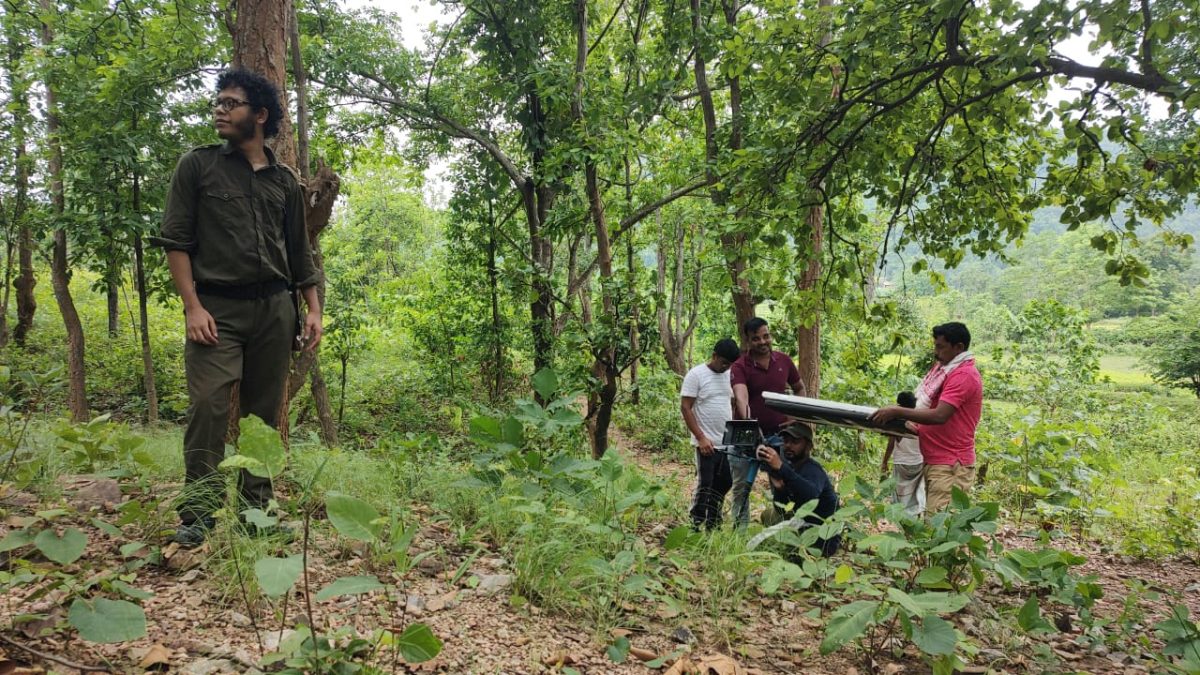
Tathagata Ghosh: Yes, I mean… I had interacted with people who knew the ex-Maoist guerrillas closely. Many of them were given a government job after 2011, when a three-decade-long Left rule collapsed in West Bengal. One of my crew members shared an experience with me. He was approached by the Maoists to join their organization, pick up weapons, and then he spent sleepless nights thinking about what to do and what not. I was actually surrounded by those stories, incidents where I got to know about the tortures the tribals had to go through. Some people who had been through such experiences were present on the set during the making of “Amar Comrade.”
They guided the actors about certain nuances. I actually wanted that to happen for authenticity, for being as close to reality as possible. After finishing the film, I showed them. They were my first audience, and they were very much moved by it. For them, cinema is about recreation and entertainment, but you know what, in most of them, I have seen an inherent artist. Art reflects in their movements, the way they build their houses, and they are very, very respectful of cinema, of art, and of me as a person and as a filmmaker as well. At times, I gave up hope, but they didn’t. Without them, the film wouldn’t have been possible at all.
More Read: Dhulo (The Scapegoat) [2021] – ‘LIFF’ Short Film Review – An angry and disillusioned look at the dirty politics and communal hate in Bengal
Soumalya: Did your film end by critiquing our moral corruptness? If so, then do you think this corruptness has developed a universal character which haunts the whole world, from metropolitan cities to remote villages of “Amar Comrade”?
Tathagata Ghosh: I think… definitely. We are surrounded by this moral corruption. Sometimes, even if we don’t want to be morally corrupt, the situation around us pushes us towards corruptness. Very few can break free from it. In capitalist societies, it is one of the biggest challenges to break free from this corruptness and express your dissent by standing up against the system. Although some people can do this—they do stand up—but they are not great in numbers… in short, we have become cowards! In the process of keeping our lives going, we have become cowards.
That is exactly what Ray said years ago at the end of “Mahanagar.” I, too, had to succumb to the system sometimes, and I hate this. I hate this constant capitalisation of society, which makes our moral conscience corrupt. Yes, I wanted to critique it, and I critiqued it. So yeah, the end of the film is important. In the end, I also wanted to highlight the space where we stand and how some people can sleep at night.
Soumalya: Last question, before we end this, we always ask our guests about their five favorite films, but since we’re called “High on Films,” could you share some movies that you believe represent the cinematic high moments, where you feel cinema truly reached its peak? What films made you feel that way?
Tathagata Ghosh: It’s always a difficult task to pick your favourite five… they might change if you ask me the same question next week. At this moment, I think I will definitely say “Pratidwandi.” It is a film I go back to very often. I’d pick “Jana Aranya” too. These two films explore the topic we were just talking about (moral corruption). The whole “Calcutta Trilogy” stands the test of time. Then I’d like to mention Ritwik Ghatak’s “Meghe Dhaka Tara.” I always cry whenever I go back to watch it. In every scene of that film, cinema peaked—so yeah… “Meghe Dhaka Tara” has to be there. Now I have to name Mrinal Sen’s “Akaler Sandhane.”
I go back to this film too quite often because it puts forth the challenges of filmmaking, and for me, it’s a love letter to cinema… I think I have named four films already, but you can consider “Pratidwandi” and “Jana Aranya” as one film since they are part of the same trilogy. And now I’ll pick “Aparajito.” It is very tough to choose between “Aparajito” and “Apur Sansar”, because when in the latter Apu describes himself in front of Pulu… that one scene makes it my favourite film.
But still, I’d recommend “Aparajito” because I relate to it a lot. Having lost my father very early in life, I relate myself a lot to Apu in “Aparajito”… it, at times, feels autobiographical. The last film I’ll recommend will be Werner Herzog’s “Grizzly Man”, and let me recommend another one… Kiarostami’s “Taste of Cherry.” These two films saved me. I watched “Grizzly Man” at a very low point in my life, and I think this film—maybe all of Werner Herzog’s films—made me realize what a gift this life is.

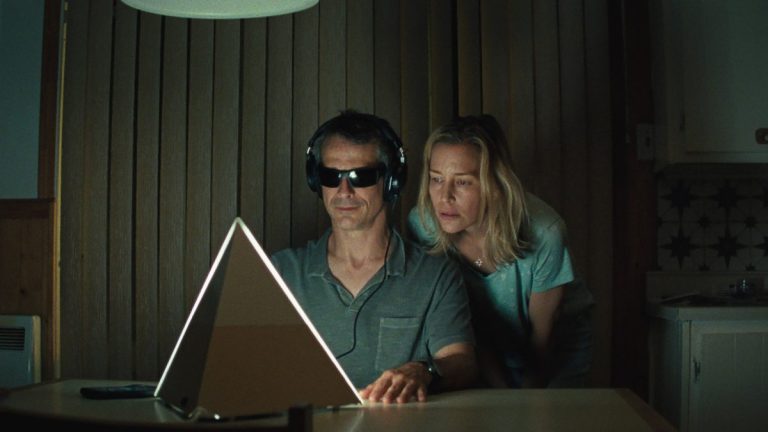

![A Tale of Two Sisters [2003] Review: Every Family Has Its Dark Secrets](https://79468c92.delivery.rocketcdn.me/wp-content/uploads/2018/09/a-tale-of-two-sisters-768x432.jpg)
